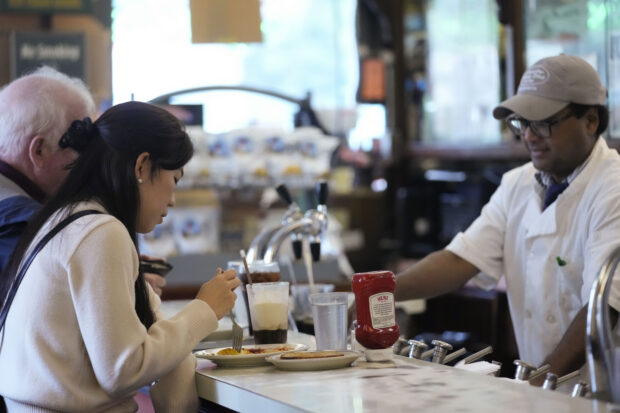
Customers eat lunch at the counter at the Lexington Candy Shop on Sept. 28, 2023, in New York. On Tuesday, June 25, 2024, the Conference Board issued its monthly survey of consumer confidence in the United States, which reflects Americans’ assessment of current economic conditions and their outlook for the next six months. (AP Photo/Mary Altaffer, File)
American consumers lost some confidence in June as expectations over the near-term future fell again.
The Conference Board, a business research group, said Tuesday that its consumer confidence index fell in June to 100.4 from 101.3 in May. The index’s decline was not quite as bad as analysts were expecting.
The index measures both Americans’ assessment of current economic conditions and their outlook for the next six months.
The measure of Americans’ short-term expectations for income, business, and the job market fell to 73 from 74.9 in May. A reading under 80 can signal a potential recession in the near future.
Consumers’ view of current conditions rose in June to 141.5, up from 140.8 in May.
“Confidence pulled back in June but remained within the same narrow range that’s held throughout the past two years, as strength in current labor market views continued to outweigh concerns about the future,” said Dana Peterson, the Conference Board’s chief economist.
Unemployment rate up
Even though the unemployment rate ticked up to 4 percent in May, America’s employers added a strong 272,000 jobs last month, a sign that companies are still confident enough in the economy to keep hiring despite persistently high interest rates.
READ: US employers added a robust 272,000 jobs in May
Last month’s sizable job gain was propelled by consumer spending on travel, entertainment, and other services. U.S. airports reported near-record traffic over the Memorial Day weekend.
Despite the better-than-expected job gains in May, there is some visible weakening in the labor market: job postings for April hit their lowest level since 2021 and the number of Americans who are receiving unemployment benefits has risen for seven straight weeks.
On Monday, Mary Daly, president of the San Francisco Fed, said that the labor market remained healthy but that future slowing could trigger higher unemployment, something that needs to be monitored closely.
Most economic indicators show the U.S. economy in good shape by historical standards, though there have been some signs that growth is slowing.
Cautious spending
The nation’s economy slowed sharply in the first quarter to a 1.3 percent annual pace in the face of high interest rates, down from a brisk 3.4 percent growth rate in the final three months of 2023.
READ: US economic growth in Q1 revised down from 1.6% to 1.3%
Retail sales inched up just 0.1 percent in May from April as still high prices on groceries and other necessities and high interest rates curbed spending.
More cautious spending in the face of inflation has some big retailers offering discounts this summer. The latest quarterly earnings reported by big retailers show that while consumers have not stopped spending, they are becoming more price-conscious and choosy.
Consumer expectations of a recession in the next year pulled back in June after rising the previous two months, the Conference Board said.